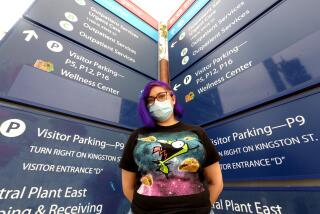WESTLAKE : Counseling Service Survives, Relocates
- Share via
Four years ago, the free mental health services provided by the Community Counseling Service, a nonprofit facility that has served the inner city since 1975, were on the verge of being wiped out by proposed cuts in county mental health expenditures.
Although the agency was spared the cuts that would have devastated its programs, the next few years were still tough. The recession dried up most of the private donations it had depended on, and the departure of a president skilled in fund raising took an additional toll.
But thanks to four years of belt-tightening and a few cuts in staff and services, the Community Counseling Service has survived, and is ready to move from the aging South-Central church it has occupied since its inception to a gleaming new 6,200-square-foot facility at 1145 Wilshire Blvd.
The service will share the site with the agency’s outpatient “Amanecer” clinic, a bilingual treatment center.
Originally an outreach program of the United University Church, the Community Counseling Service provides individual and family counseling, gang intervention, suicide prevention, medication, job skills education, referrals and shelter to residents of the Westlake and Pico-Union areas as well as South-Central.
Over the years, the agency has opened two residential facilities, one a short-term home with psychiatric services for mentally ill homeless adults near the church, and another for troubled adolescent Latinas in Hollywood.
During the recent lean years, the agency struggled to keep both homes and the Amanecer facility afloat. A second outpatient facility that provided sliding scale fee-for-service treatment for middle-class patients without health insurance in the Wilshire area had to be closed.
“It drained all our resources just to survive,” said Hugh Biele, who became president a year ago.
Thanks to the diversification of some of its programs, the agency’s thriftiness over the past few years has been complemented by funding from United Way and community development grants.
To remain out of the woods, the agency will continue seeking additional grant funds, and will try to work with other agencies to stretch services, executive director Craig Schweon said.
By combining under one roof its administrative and outpatient functions, the agency will save money in the long run, Schweon said. If funding allows, the future could include setting up another fee-for-service program for uninsured patients.
More to Read
Sign up for Essential California
The most important California stories and recommendations in your inbox every morning.
You may occasionally receive promotional content from the Los Angeles Times.













